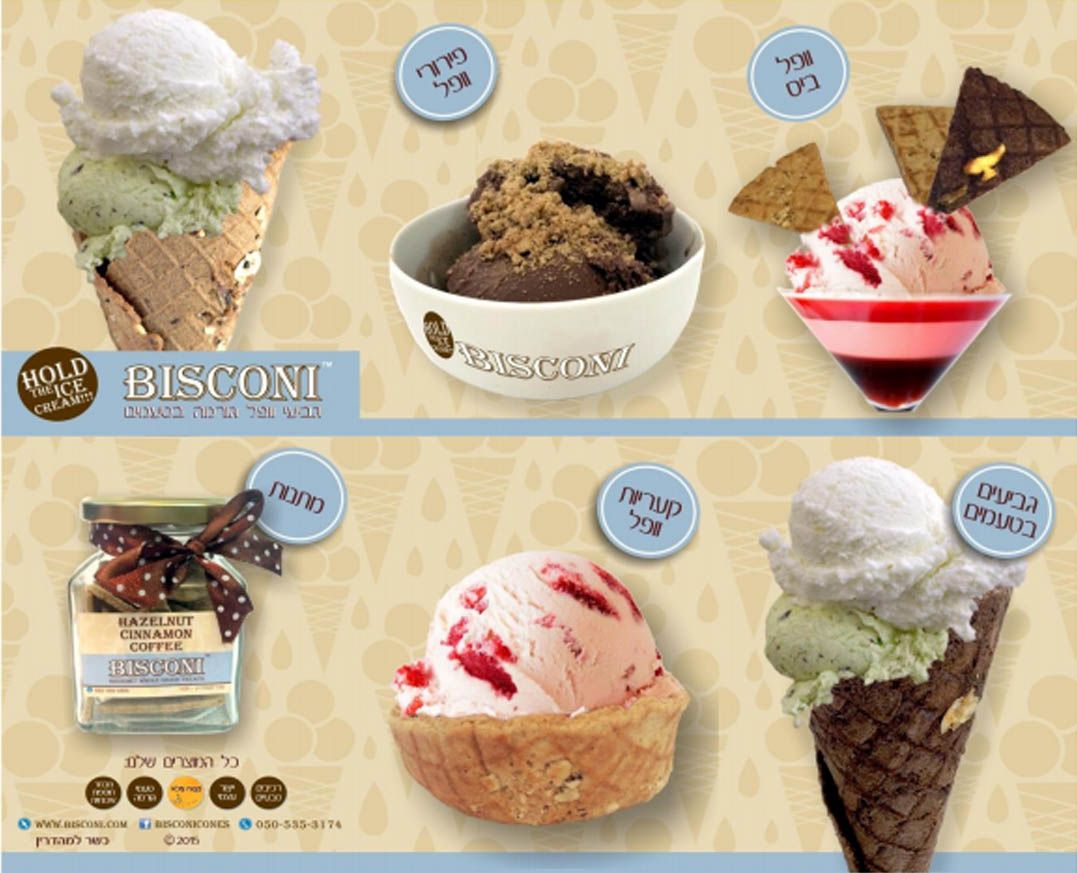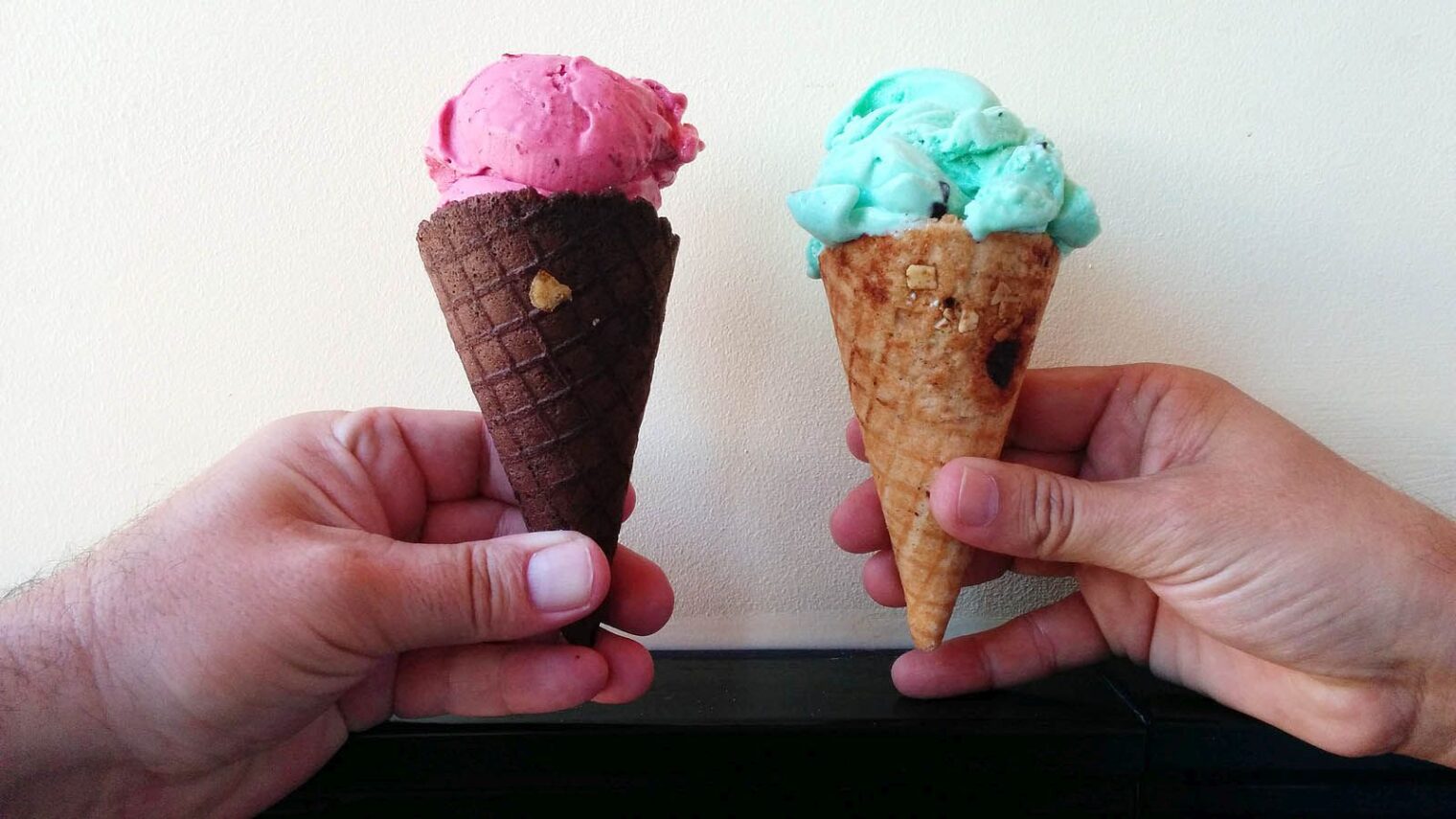Bisconi. Remember that name. And remember that it started in Israel.
The gourmet food startup quietly introduced its whole-grain, naturally flavored ice-cream cones to parlors in Tel Aviv and Jerusalem last October. The small-scale local sales are part of a proof-of-concept plan to verify that Bisconi is ready for the global market.
Two big ice-cream industry players – one a multinational corporation, the other a European bigwig – sought out Bisconi and are already in dialogue with the company, which has yet to launch a marketing campaign.
“We are a gourmet startup. Our goal is not to sell a few cones in a small ice-cream shop in Tel Aviv but it is to take the world by storm,” Scott Apfelbaum, co-founder of Bisconi, tells ISRAEL21c. “We feel that we have stumbled upon — by good luck, good fortune and ingenuity– an industry game-changer.”
Bisconi actually makes an array of products from the same kosher whole-grain pastry base – waffle cones, bites (like pita chips), edible bowls, petit four bases and crumble.

From its first appearance in China around 200 BCE to today, ice cream has gained gourmet prominence, yet the waffle cone in which it’s served has pretty much remained the same for the past century.
“Ice-cream cones are the holy grail of the industry,” says co-founder David Beker.
“There’s nobody else doing anything like this,” adds Apfelbaum.
$50 billion market
In 2014, the global ice-cream market reached sales of more than $50 billion. One of the hottest trends in this frozen-dessert market is premium, gourmet products. That’s where Bisconi has aligned itself.
Two and a half years ago, Apfelbaum, who has over 25 years of senior management experience, changed his diet to include only whole grains. His love for ice cream in a cone was a weak spot he didn’t want to forgo.
So he and his wife, Zavi (senior head of brand management at the Ministry of Foreign Affairs), started tinkering in the kitchen to find a homemade whole-grain cone to satisfy his cravings. “Obviously, it’s not healthy because it’s still ice cream,” concedes Apfelbaum, “but it’s a healthier alternative.”
“We feel that we have stumbled upon — by good luck, good fortune and ingenuity– an industry game-changer.”
Upon creating the perfect cone, the father of four turned to his friend Beker, who worked in social services for 20 years, to help develop the concept; and to Robbie Frohlinger, who has over 25 years of experience in creating, developing and managing successful retail businesses, to launch Bisconi.
They came up with five flavors but cut back to focus on testing three of them – chocolate-orange, cherry-almond and hazelnut-cinnamon-coffee. Lemon-ginger and coconut-rum were left behind for now.
“There is no question about going forward with new flavors, more variety, gluten-free, spelt cones, a children’s line; the options are endless,” Beker and Apfelbaum say. “We might also make a savory cone. We envision minis down the line for catering and weddings, corporate events. We come up with new ideas all the time. There’s so much one can do with the base product it’s really amazing.”
A perfect taste test
Some chefs in Jerusalem are using Bisconi bowls for their desserts. A few high-end shops in Tel Aviv and Jerusalem are selling Bisconi Bites (NIS 20-NIS 28).
You can only get the cones when ordering ice cream at one of the gourmet ice-cream shops in Tel Aviv, Jerusalem and most recently, Beersheva. The parlors tend to add between NIS 2-5 per helping for the specialty cone.
ISRAEL21c tried mango and passionfruit ice cream with the three flavors of cones. The cherry-almond cone made the ice cream taste even better.
The Bisconi team doesn’t suggest which ice cream to eat with which cone. But they have a chef/flavor specialist helping them behind the scenes and they say that will eventually be part of a campaign.

“People in Israel like to try new things. And they don’t mind paying a few extra shekels for a gourmet product,” says Kobi Elbaz of Neve Tzedek Ice Cream in Tel Aviv, one of the first stores to add Bisconi cones to the display cabinet.
“There is no better place than Israel to be doing this. Israelis are known for being early adopters and the owners of these gourmet ice-cream shops have been early adopters for our product. We have not had anyone who has turned us down and wouldn’t sell our products,” Apfelbaum tells ISRAEL21c. “I think in general people like the idea of something new.”
For now, the cones are handmade in an Israeli bakery. But with their eyes on filling the big orders from abroad – “one of the companies to contact us wants tens of millions of units” — the Bisconi cofounders are seeking contract manufacturers in Europe and North America.
As for the company’s name, the three American immigrants mashed the words “biscotti” and “cone” together. But the name works in Hebrew as well – bis means “take a bite” and coni is similar to “cone.”
Beker clarifies that Bisconi doesn’t view itself “as a company making ice-cream cones. We view ourselves as an Israeli gourmet startup success story and game changer.”
Adds Apfelbaum: “It’s been an amazing journey so far. And we get to have meetings in ice-cream stores. There’s nothing better than that.”
















